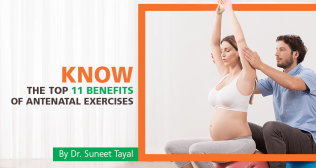
Detection of Down Syndrome during Pregnancy
Down syndrome is a genetic birth defect where a person is born with an extra chromosome number 21. Most people with Down syndrome have mild to moderate intellectual disability and need supervision throughout their lives. They have characteristic facial features and commonly have congenital anomalies, medical problems with lifespan ranging between 50 to 60 years.
Down syndrome can be detected during pregnancy through various tests. These tests can identify the risk of Down syndrome or diagnose it with a high degree of accuracy.
Types of Tests for Down Syndrome During Pregnancy
There are two types of tests for Down syndrome during pregnancy:
Screening Tests
These tests assess the risk of Down syndrome.
- First-trimester screening is typically done at 11 to 13 weeks of pregnancy.
The blood test measures levels of certain proteins (PAPP-A and free beta-hCG) in the mother's blood. The ultrasound measures the nuchal translucency and other developmental anomalies (fluid at the back of the baby's neck). The results, along with the mother's age, are used to calculate the risk of Down syndrome.
- Second-trimester serum screening
also known as a triple or quad screen, has a sensitivity (the ability to correctly identify affected pregnancies) ranging from 67% to 81%, with a false-positive rate of around 6%. It is typically done at 16 to 18 weeks of pregnancy to measures levels of specific substances (markers) in the mother's blood, including alpha-fetoprotein (AFP), human chorionic gonadotropin (hCG), unconjugated estriol (uE3), and inhibin A.
Integrated serum screening combines results from tests done during the first and second trimesters.
- Genetic sonogram is a type of ultrasound performed during the second trimester that goes beyond basic structural scans to look for specific markers associated with Down syndrome. It checks for physical characteristics that may indicate Down syndrome and other structural defects.
- Non-invasive prenatal testing (NIPT) - Baby’s DNA enters mother's blood through the placenta. Measurement of circulating cell-free DNA in mother's blood can be done beginning at 10 or 11 weeks of pregnancy. While results of this testing are highly accurate (It identifies more than 99% of cases of Down syndrome with low rates of false positive) not all chromosomal abnormalities may be detected due to placental, maternal or foetal mosaicism, or other causes.
Diagnostic Tests
These are invasive tests that can confirm the presence of Down syndrome but may have additional risk of miscarriage (less than 0.5% to 1%)
- Chorionic Villus Sampling (CVS): CVS, carried out to obtain placental cells for genetic analysis, it can be performed between 11+0 and 14+6 weeks of gestation.
- Amniocentesis: This involves taking a sample of amniotic fluid for genetic analysis, usually offered from 15+0 weeks of gestation and is performed under direct ultrasound guidance by trained experts to ensure accurate sampling and minimize risks. Withdraws a sample of amniotic fluid for confirming presence of extra chromosome 21 by genetic testing (FISH- Fluorescence in Situ Hybridization & Chromosomal Microarray 315K)
When to Undergo Testing
A pregnant person of any age can have a baby with Down syndrome, regardless of age, health, and healthy behaviors.
The American College of Obstetricians and Gynaecologists (ACOG) recommends that all pregnant women, regardless of age, be offered screening for Down syndrome.
What to Expect
If the screening test indicates a high risk of Down syndrome, the doctor may recommend diagnostic testing. If the diagnostic test confirms Down syndrome, the doctor will discuss the implications and options with the parents.
It's essential to remember that these tests are not 100% accurate, and there may be false positives or false negatives. Consult with your obstetrician to determine the best course of action.
Categories
Clear allMeet the doctor

- Obstetrics and Gynaecology | Obstetrics and Gynaecology | Robotic Surgery
-
18 Years
-
1000



















